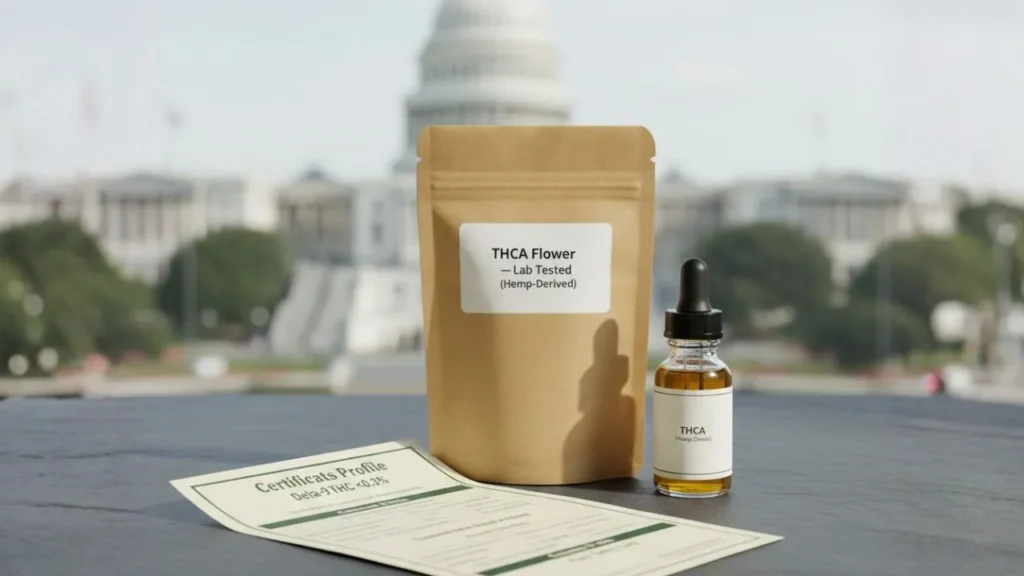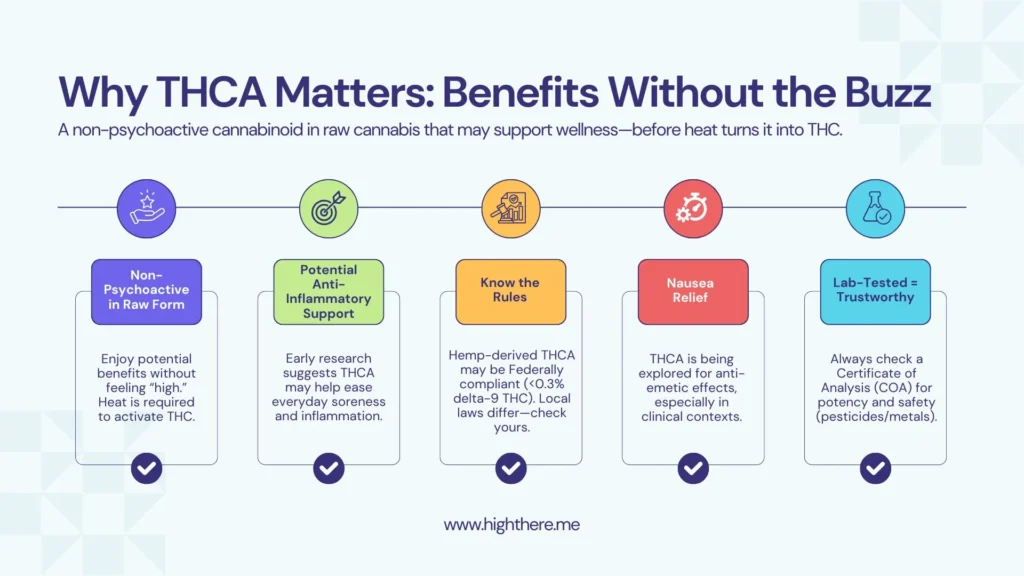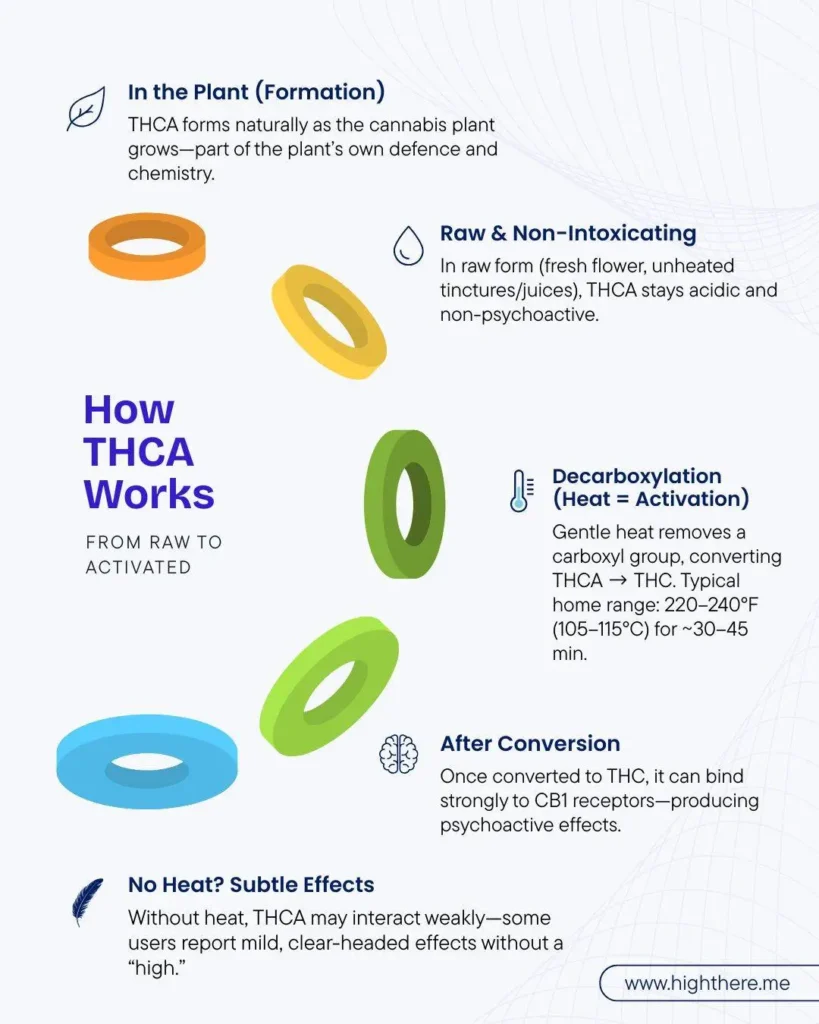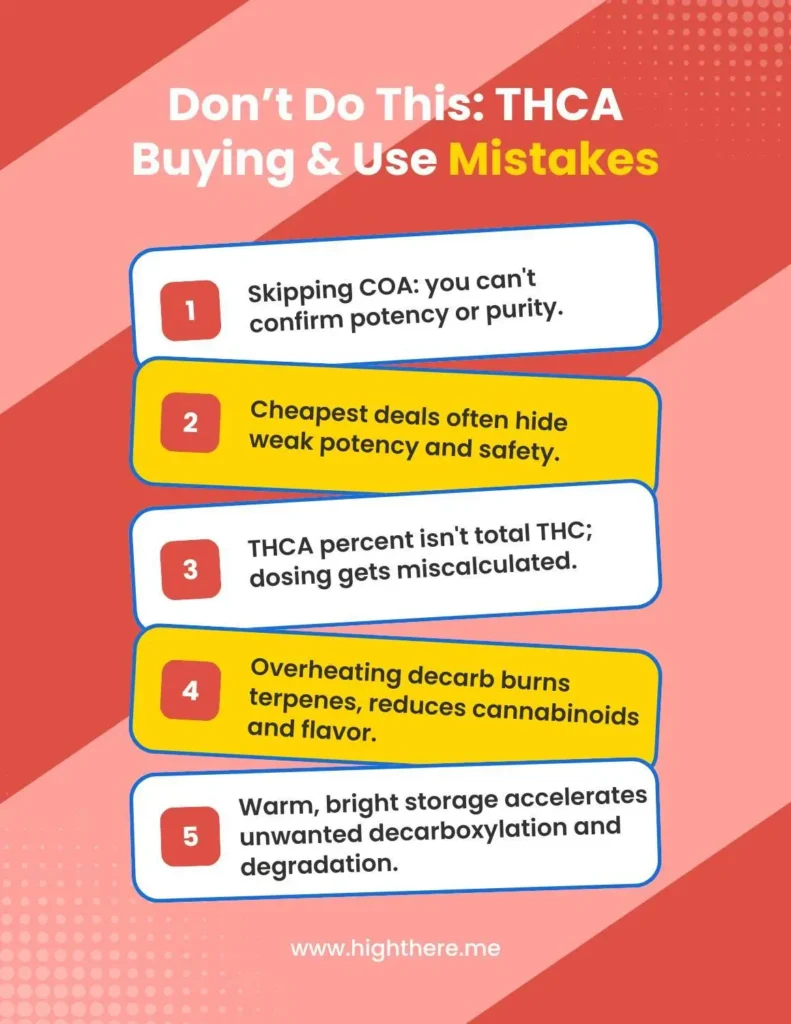Have you ever wondered why some cannabis products promise relief without the buzz? As more Americans explore natural wellness options, THCA emerges as a key player in the cannabis world. For example, this non-psychoactive compound, found in raw cannabis plants, offers potential benefits like reducing inflammation and supporting neuroprotection, making it appealing for both new buyers and seasoned users.
Whether you’re a college student seeking stress relief or an adult managing daily aches, understanding this compound helps you make smarter choices. Therefore, in this guide, we dive into what is thca in cannabis, its effects, and why it’s gaining traction across the US. By the end, you’ll feel confident navigating options, especially in places like Washington, D.C. dispensaries, where premium products are readily available.
What Is THCA?
Let’s start with the basics. THCA, or thc-a, stands for tetrahydrocannabinolic acid. It’s a naturally occurring cannabinoid in fresh, unheated cannabis plants. Unlike its well-known counterpart, THC, it doesn’t produce psychoactive effects on its own. For instance, you find it in raw forms like fresh flowers or juices from the plant.
Additionally, think of it as the “raw” version of THC. In the cannabis plant, it acts as a precursor, meaning it transforms into THC when exposed to heat or light over time. This process, called decarboxylation, removes a carboxyl group from the molecule, activating its potential. Consequently, for beginners, this means raw cannabis salads or tinctures contain mostly this acidic cannabinoid, while smoked or vaped products deliver THC.
Moreover, why does this matter? THCA is legal in many states under the 2018 Farm Bill if derived from hemp with less than 0.3% delta-9 THC. However, regulations vary, so always check local laws, particularly in Washington, D.C., where cannabis is recreationally legal for adults 21 and over.
Why It Matters: Importance and Benefits of THCA
Now, you might wonder, what does thca do? This compound shines for its potential health benefits, drawing in users who want cannabis perks minus the intoxication. For example, research suggests it has anti-inflammatory properties, which could help with conditions like arthritis or muscle soreness.
Consider a real-life example: Sarah, a 35-year-old office worker in Washington, D.C., deals with chronic back pain from long hours at her desk. She tried tinctures rich in this cannabinoid and noticed reduced inflammation without feeling foggy, allowing her to stay productive. Similarly, studies show possible neuroprotective effects, potentially aiding in brain health and even nausea relief for chemotherapy patients. For more reading, see this comprehensive cannabis guide.
Furthermore, it appeals to medicinal users. A 2024 report indicates that non-psychoactive cannabinoids like this one are sought by 40% of medical cannabis patients for symptom management without impairment. For cannabis enthusiasts exploring new forms, it provides versatility—use it raw for wellness or heat it for recreational effects.
Benefits extend to everyday wellness too. Specifically, users report better sleep and appetite regulation, though more research is needed. Importantly, is thca real thc? No, but it converts to THC, offering dual potential. Thus, this makes the compound relevant for beginners avoiding highs and intermediates seeking balanced options. Learn more in this high THC strains article.
THCA Key Features, Pros, and Cons
To begin with, let’s break down its standout features. It’s available in forms like flowers, tinctures, edibles, and concentrates, each suiting different preferences. Explore more cannabis strains to see how they compare.
- Non-psychoactive in raw form: Ideal for daily use without impairment.
- Potential therapeutic benefits: Anti-inflammatory, neuroprotective, and anti-nausea effects.
- Versatile consumption: Eat raw, juice, or heat for THC conversion.
- Legal accessibility: Often compliant with federal hemp laws, easier to buy in many areas.
- Mild side effects: Fewer risks of anxiety or paranoia compared to THC.
How THCA Works: A Step-by-Step Explanation
Understanding how to use thca tinctures safely or other forms starts with its mechanism. It interacts with your body’s endocannabinoid system, but differently from THC.
Step 1: Initially, in the plant, this acidic compound forms as the cannabis grows, protecting it from pests and UV rays.
Step 2: When harvested raw, it remains acidic and non-intoxicating. For instance, you can consume it directly via juicing or edibles for raw benefits. Check out Purple Kush for a classic example.
Step 3: Decarboxylation activates it. Heat (like smoking or baking) removes the carboxyl group, turning it into THC. For example, bake at 220-240°F for 30-45 minutes to convert.
Step 4: Once converted, it binds to CB1 receptors in the brain, producing effects if desired.
Step 5: Alternatively, for non-heated use, it may bind weakly, offering subtle relief without highs.
THCA vs. THC: A Detailed Comparison
Confused about thca concentrate vs thc difference explained? Here’s a side-by-side look:
| Aspect | THCA | THC |
|---|---|---|
| Molecular Structure | Has an extra carboxyl group (C25H30O4), making it larger and non-psychoactive. | Lacks carboxyl group (C21H30O2), making it psychoactive. |
| Effects | Offers potential wellness benefits without highs. | Delivers euphoria and relaxation but can cause impairment. |
| Consumption | Raw (juicing, edibles) for non-psychoactive use. | Heated (smoking, vaping) for psychoactive effects. |
| Legality | Often legal via hemp under federal law. | Restricted in non-legal states. |
| Benefits | Anti-inflammatory, neuroprotective without psychoactivity. | Anti-inflammatory, pain relief with psychoactive effects. |
Ultimately, for beginners, choose this acidic form for daytime use; THC for evenings. In Washington, D.C., options like high-potency strains make comparison easy.
How to Choose and Use THCA Products: A Buyer’s Guide
Navigating the world of Thca cannabis can be overwhelming. At highthere.me, we’ve delivered over 5,000 orders a month right here in Washington, D.C., so we know what to look for. Here’s how to find the best products.
1. Prioritize Lab-Tested Products
Always, choose products that have been tested by a third-party lab. A Certificate of Analysis (COA) will verify the product’s cannabinoid profile, including its content, and ensure it’s free from pesticides, heavy metals, and other contaminants. This is the number one rule for consumer safety.
2. Consider Your Desired Effect
Are you looking for the non-psychoactive benefits of raw versions, or are you after the potent high of THC? If it’s the latter, any product you smoke or vape will deliver. If you want the former, look for tinctures, topicals, or raw juices designed to avoid heat.
3. Explore Different Product Types
- Flower: This is raw, cured cannabis flower high in thca. It’s the most versatile option. You can smoke it, vape it, or even make your own edibles. If you’re looking to buy thca flower near me, ensure you’re choosing a trusted dispensary.
- Pre-rolls: Perfect for convenience. These are ready-to-smoke joints filled with high-content flower. They are often considered the best thca pre-rolls for beginners due to their ease of use. See an example product: Big Chief prerolls.
- Tinctures & Oils: These are taken sublingually (under the tongue) and can offer the potential benefits of this cannabinoid without immediate psychoactivity, depending on the formulation. Learning how to use thca tinctures safely is key—start with a low dose.
- Edibles/Gummies: These are created by infusing extracts and then heating during production to activate THC. Always check the packaging to see if the THC is active. For those on a budget, finding affordable thca gummies is possible, but quality should never be compromised.
- Concentrates: These are highly potent forms, such as diamonds or sauce. Understanding the thca concentrate vs thc difference explained is crucial here; they are essentially the same once heated, but concentrates offer unparalleled purity and strength.
Expert Insights and Data-Driven Points On THCA
Notably, experts like those from WebMD note its promise in anti-emetic roles, backed by preliminary studies. Additionally, a 2025 report shows US cannabis sales reaching $35 billion, with products containing this cannabinoid driving 72% of dispensaries’ growth.
Moreover, Dr. Ethan Russo, a cannabis researcher, highlights potential neuroprotective effects for conditions like epilepsy. In fact, data from 2024 indicates 40% compliance inquiries for hemp-derived acidic cannabinoids post-Farm Bill.
For example, a study participant used such products for pain, reporting 30% symptom reduction without side effects. Thus, these insights underscore its role in informed cannabis use.
Common Mistakes to Avoid
- First, new users often stumble by skipping lab reports—always verify potency and purity to avoid contaminants.
- Second, chasing cheap prices; low-cost options might lack quality, leading to weak effects.
- Third, improper storage: Keep in cool, dark places to prevent accidental decarboxylation.
- Fourth, confusing percentages: THCA % isn’t total THC; calculate properly for dosing.
- Fifth, overheating during decarb: Use low temps to preserve terpenes.
- Finally, avoid buying from unverified sites; stick to trusted spots like Highthere in Washington, D.C., for lab-tested strains for pain relief.
Frequently Asked Questions
Q: What is thca weed?
A: It refers to cannabis flower rich in thc a, non-psychoactive until heated. For instance, it’s often consumed raw in smoothies or tinctures for health benefits. This makes it ideal for medicinal users seeking relief without impairment. Always choose lab-tested products for safety.
Q: Can thca get you high?
A: No, raw versions won’t get you high; they need heat to become THC. Consequently, consuming it raw offers therapeutic effects without psychoactivity. Always store properly to avoid unintended conversion. Consult with experts for proper usage guidance.
Q: Does thca turn into thc?
A: Yes, through decarboxylation via heat or time. For example, baking or smoking triggers this change, turning it into psychoactive THC. Control the process to choose your desired effect. Use precise temperatures to maintain quality.
Q: Where to buy thca flower Washington DC?
A: Look for reputable shops like Highthere, offering premium, lab-tested options with delivery. Additionally, they provide curbside and in-store pickup for convenience. Check their 600+ five-star reviews for trust. Always verify product authenticity before purchasing.
Q: Best thca pre-rolls for beginners?
A: Start with low-potency strains; check reviews for mild effects. Moreover, Highthere offers beginner-friendly products with clear labeling. Consult staff for personalized recommendations. Begin with small doses to assess tolerance.
Conclusion
In summary, this cannabinoid offers a non-intoxicating path to cannabis benefits, from inflammation relief to neuroprotection, differing from THC in its raw potency. Whether you’re new or experienced, it empowers informed decisions. Ready to try? Visit Highthere for premium options in Washington, D.C.—with over 600 five-star reviews and 5000+ monthly deliveries, experience “Real eyes realize real highs.” Shop now for curbside pickup and elevate your wellness journey.





